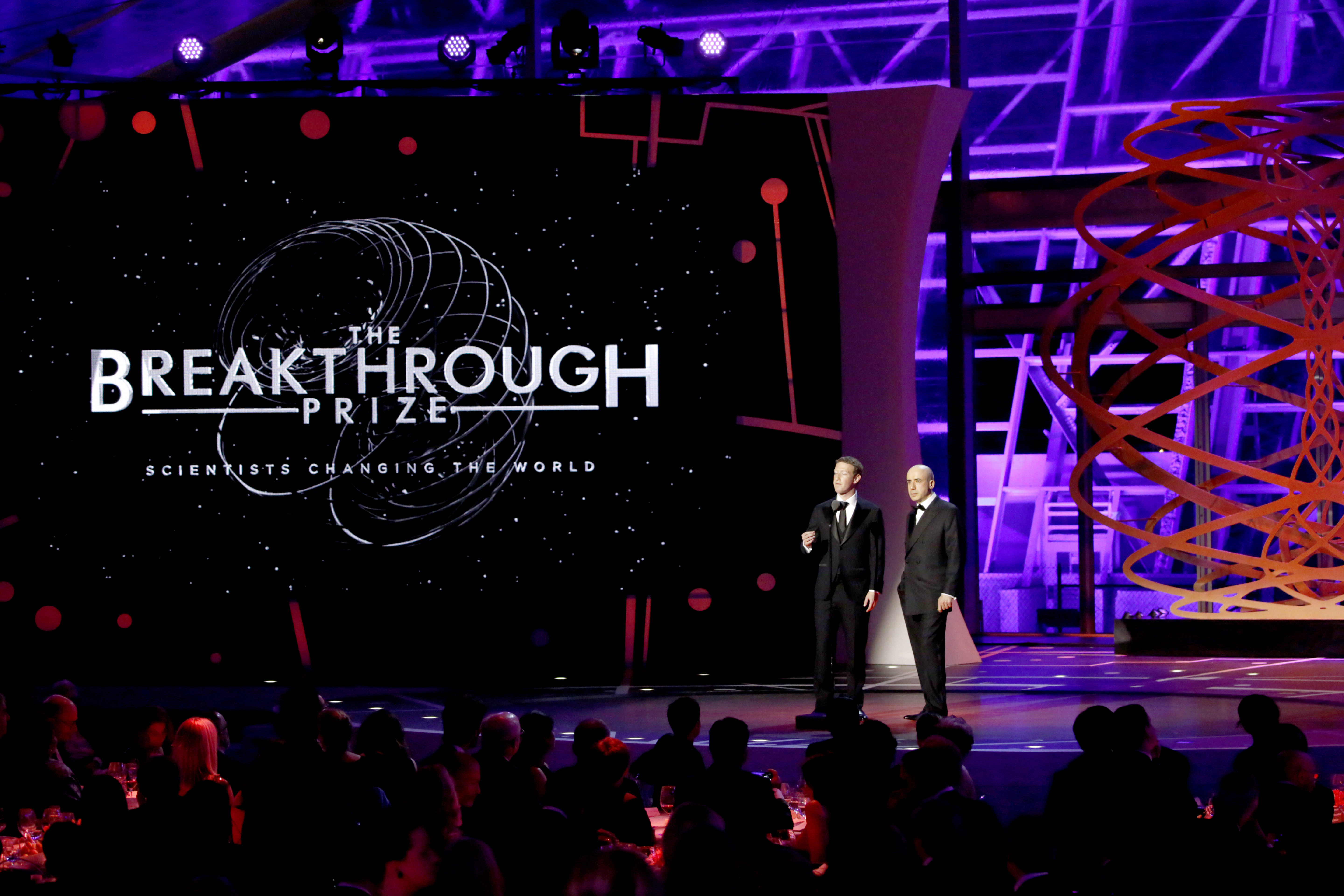Glitzy ‘Science Oscars’ to make stars of researchers
MOUNTAIN VIEW, CA – DECEMBER 04: Breakthrough Prize Co-Founders Mark Zuckerberg (L) and Yuri Milner speak onstage during the 2017 Breakthrough Prize at NASA Ames Research Center on December 4, 2016 in Mountain View, California (Kimberly White)
Washington (AFP) – Nine scientists were recognized Wednesday with a “Breakthrough Prize,” a $3 million Silicon Valley-funded award meant to confer Oscars-style glamour and prestige on the basic sciences.
The prizes in physics, life sciences and mathematics went to six men and three women, including four researchers who shared two prizes and five who get the full reward to themselves.
Vincent Lafforgue, of France’s National Center of Scientific Research (CNRS), was awarded the prize in mathematics for groundbreaking work in multiple areas.
Five US-based researchers who won prizes in the life sciences included Frank Bennett and Adrian Krainer, from companies in Carlsbad, California and Long Island, New York.
They were recognized for their discovery of a DNA-linked process that led to a treatment for a rare infantile disorder, spinal amyotrophy.
They were joined by Chinese-born scientists Xiaowei Zhuang (Harvard), who developed a new tool for super-resolution molecular imagery, and Zhijian “James” Chen (University of Texas), for his discovery of a DNA-sensing enzyme that could be associated with auto-immune disorders.
The US-based contingent was completed by Angelika Amon, an Austrian researcher at MIT, for determining the consequences of aneuploidy, when a cell does not have the normal number of chromosomes.
The physics prizes went to Charles Kane and Eugene Mele (University of Pennsylvania) and Jocelyn Bell Burnell (Oxford), an astrophysiciest who was the recipient of a special prize in fundamental physics.
Six $100,000 awards also were given to 12 researchers for promising early career work.
The “Breakthrough Prize” is only six years old but it is far more lavish than the coveted Nobel, which comes with prize money of around $1 million and is often shared by two or three laureates.
The prizes will be presented at a star-studded red carpet ceremony in November, hosted at a NASA research center in Silicon Valley by actor Pierce Brosnan.
– Thrill of discovery –
The mathematics prize propels 44-year-old Lafforgue into a celebrity world which has not typically been part of his day-to-day work, he acknowledged.
“I’m game,” he told AFP before the official announcement. “It’s American culture.”
He recalled that Yuri Milner, a physician and internet pioneer who became a prominent Silicon Valley investor, created the prize in 2012 to make scientists stars, hoping to repopularize the basic sciences and generate public support.
“Breakthrough Prize” patrons include Facebook founder Mark Zuckerberg, Google co-founder Sergey Brin and Ma Huateng, founder and CEO of Chinese internet giant Tencent.
Unlike the Nobel, which often goes to retirees, the “Breakthrough Prize” seeks to recognize recent discoveries, and not necessarily concrete applications of their work.
“One does math for its beauty, not for its applications,” said Lafforgue, while stressing that there are applications of his work in the field of cryptography.
He has pursued interests in various subjects over the course of his career, thanks to the freedom he enjoys at CNRS.
“The mathematical objects that we study possess a beauty and a harmony that unfortunately is difficult to explain to a non-mathemtician,” he said.
Ammon’s work could one day lead to new cancer drugs, because tumors almost always have an abnormal number of cancers.
“I’ll be very honest with you, for me the primary drive of my research is not to develop new treatments. If that happens, obviously I’m thrilled,” the MIT professor of biology told AFP.
“But as basic researchers, we really are mostly interested in learning things and expanding people’s horizons.”
What drives Ammon, 51, is “the thrill of discovering something, there’s nothing like it.”
“Once you experience it you’re hooked.”
Disclaimer: This story has not been edited by Siliconeer and is published from a syndicated feed. Siliconeer does not assume any liability for the above story. Validity of the above story is for 7 Days from original date of publishing. Content copyright AFP.


